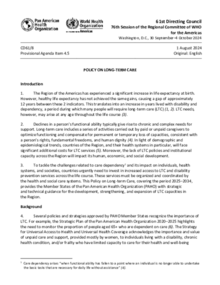CD61/8 - Policy on Long-term Care

|
Introduction 1. The Region of the Americas has experienced a significant increase in life expectancy at birth. However, healthy life expectancy has not achieved the same gains, causing a gap of approximately 12 years between these 2 indicators. This translates into an increase in years lived with disability and dependency, a period during which many people will require long-term care (LTC). LTC needs, however, may arise at any age throughout the life course. 2. Declines in a person’s functional ability typically give rise to chronic and complex needs for support. Long-term care includes a series of activities carried out by paid or unpaid caregivers to optimize functioning and compensate for permanent or temporary loss of capacities, consistent with a person’s rights, fundamental freedoms, and human dignity. In light of demographic and epidemiological trends, countries of the Region, and their health systems in particular, will face significant additional costs for LTC services. Moreover, the lack of LTC policies and institutional capacity across the Region will impact its human, economic, and social development. 3. To tackle the challenges related to care dependency and its impact on individuals, health systems, and societies, countries urgently need to invest in increased access to LTC and disability prevention services across the life course. These services must be organized and coordinated by the health and social care systems. This Policy on Long-term Care, covering the period 2025–2034, provides the Member States of the Pan American Health Organization (PAHO) with strategic and technical guidance for the development, strengthening, and expansion of LTC capacities in the Region. |
